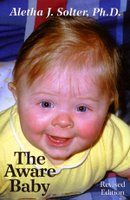 Aletha Solter, a student of Jean Piaget, has written three books for parents that have some valuable thoughts in them. The Aware Baby, Tears and Tantrums, and Helping Young Children Flourish each share a similar message, that is sometime babies just need to cry.
Aletha Solter, a student of Jean Piaget, has written three books for parents that have some valuable thoughts in them. The Aware Baby, Tears and Tantrums, and Helping Young Children Flourish each share a similar message, that is sometime babies just need to cry.I discovered her books before my third child was born, and gained another parenting tool that became very helpful to me. I have found the cry it out beliefs to be very detrimental to children, and their relationships with their parents. When an infant is left to cry, he learns that he is not heard, and he will not be responded to. He misses out on one of Erik Erikson's stages of development, that of being able to trust. So, I responded to my first two children's cries, even though it was hard at times to do so. I always tried to get them to stop crying, and if they didn't, I felt that I was doing something wrong as a parent. I felt guilty and overwhelmed at times, because I didn't know how to "help" my child.
Solter's ideas helped me to see that I still needed to respond to my children's cries (this is something I just knew instinctively I needed to do), but that sometimes, after all other needs are met, a baby (or child) still has a need to cry.
I like to relate it to myself. When I am distraught, and feel like crying, the best thing for me to do it cry and work it out that way. Often what we do to babies, is to tell them to be quiet, by bouncing, putting a pacifier in their mouth, shushing them, telling them don't have to cry, feeding them, and the list goes on and on. If I was crying, and someone told me to be quiet, or tried to get me to stop when I really needed a good cry, I would resent it. I would not like it, and if I was not allowed to cry, those emotions would be bottled up inside.
All this said, a baby should NEVER be left to cry alone. She should be held close by and you should focus your loving attention on her as she cries. Solter's books go into much greater detail. There is good information to think about in her books. The downside is that the format isn't one that most of us are used to. It is not flashy, and it is set up in a question/answer format. There may be some information that some parents do not feel fits them (as in most books), and if you find that this is the case, then by all means, do not use those ideas!
One of the best things that this book did for me, was to help me realize that crying was not a sign of me being a "bad" parent.

No comments:
Post a Comment